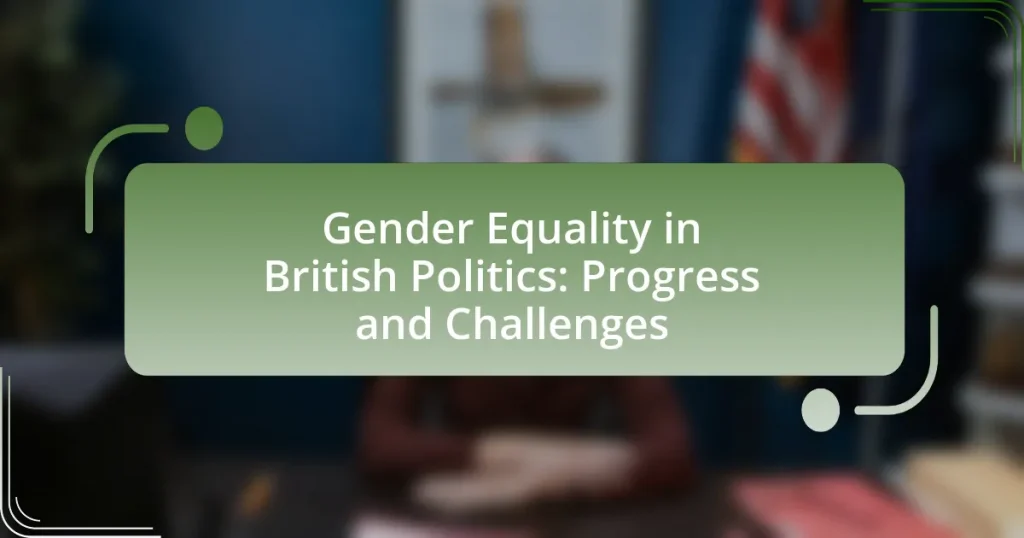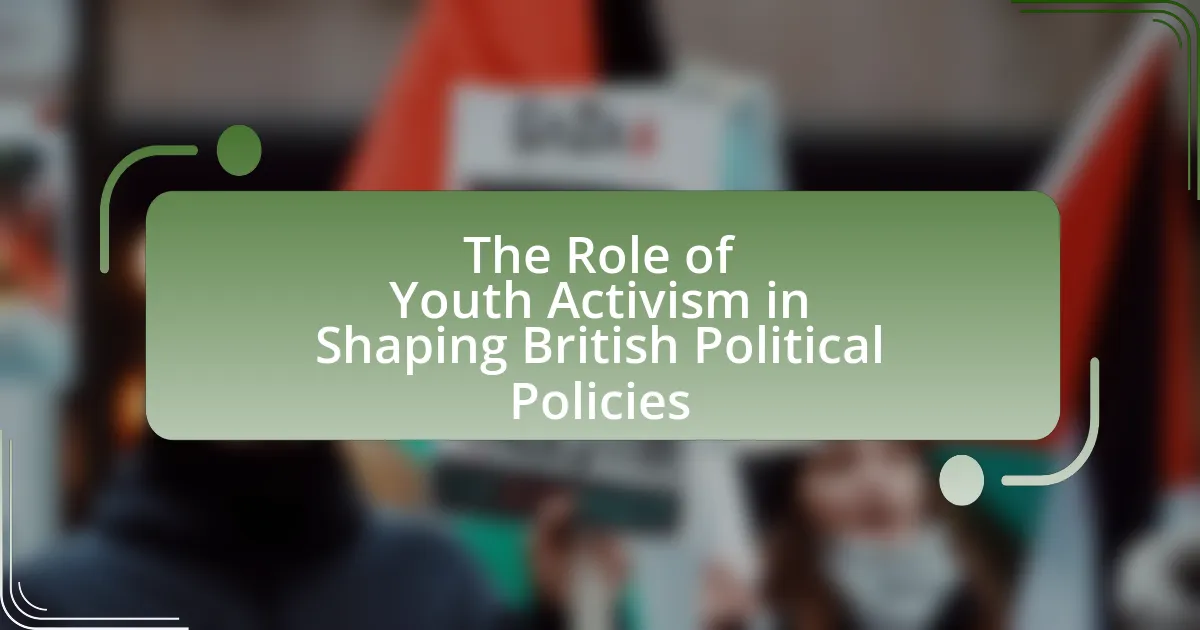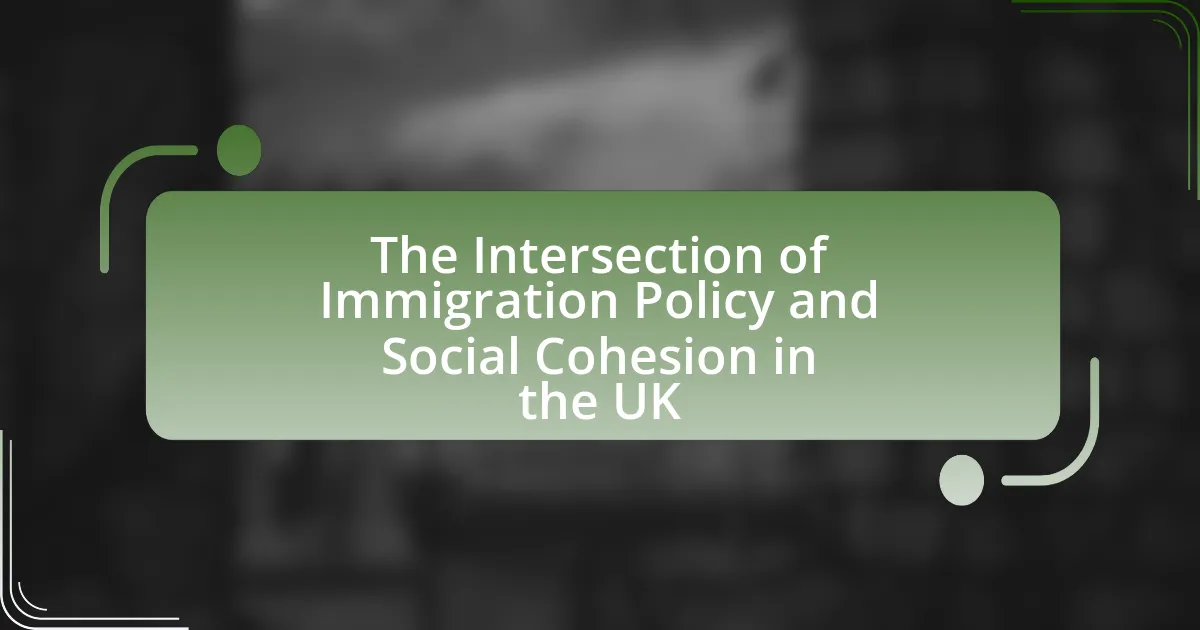Gender equality in British politics encompasses the equal representation and participation of all genders in political processes and leadership roles, supported by legislation such as the Equality Act 2010. Despite notable progress, including women holding 34% of seats in the House of Commons as of 2023, challenges persist, particularly in underrepresentation of women and non-binary individuals. The article examines the historical evolution of gender equality, key milestones, societal influences, and the role of political parties and advocacy groups in promoting gender parity. It also addresses ongoing barriers, the impact of gender imbalance on policy-making, and strategies to enhance female political participation.
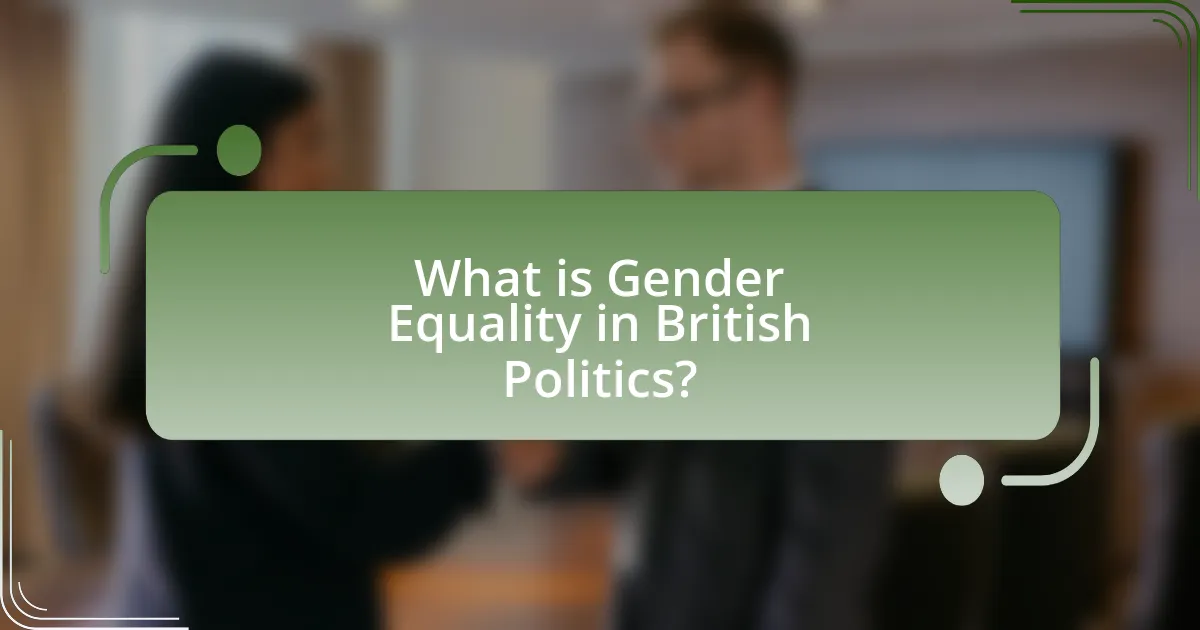
What is Gender Equality in British Politics?
Gender equality in British politics refers to the equal representation and participation of all genders in political processes, decision-making, and leadership roles. This concept is supported by various legislative measures, such as the Equality Act 2010, which aims to eliminate discrimination and promote equality across different sectors, including politics. Despite progress, challenges remain, as women and non-binary individuals continue to be underrepresented in Parliament and local government, with women holding approximately 34% of seats in the House of Commons as of 2023.
How has gender equality evolved in British politics over time?
Gender equality in British politics has evolved significantly, particularly since the late 20th century. Initially, women faced substantial barriers to political participation, with the Representation of the People Act 1918 granting limited voting rights to women over 30, and full equality achieved only in 1928 when women gained equal voting rights with men. The introduction of gender quotas in political parties during the 1990s further accelerated women’s representation, leading to a notable increase in female Members of Parliament, which rose from 9.2% in 1997 to 34% in 2019. Additionally, the establishment of organizations like the Women’s Equality Party in 2015 has highlighted ongoing issues and advocated for further reforms. These developments illustrate a progressive trajectory towards gender equality in British politics, marked by legislative changes and increased female representation.
What historical milestones have marked progress in gender equality?
Key historical milestones that have marked progress in gender equality include the passing of the Representation of the People Act in 1918, which granted voting rights to women over the age of 30 in the UK, and the Equal Pay Act of 1970, which aimed to eliminate wage disparity based on gender. The 1918 Act was a significant turning point, as it allowed women to participate in the democratic process, reflecting a shift in societal attitudes towards women’s roles. The Equal Pay Act established the legal framework for women to receive equal pay for equal work, addressing economic inequality. Additionally, the introduction of the Sex Discrimination Act in 1975 further advanced gender equality by prohibiting discrimination based on sex in employment and education. These milestones collectively represent critical advancements in the pursuit of gender equality in British politics.
How have societal attitudes towards gender roles influenced political representation?
Societal attitudes towards gender roles have significantly influenced political representation by shaping the expectations and opportunities for individuals in political positions. Traditional views often relegated women to domestic roles, limiting their participation in politics, which is evident in historical data showing that women held only 3% of parliamentary seats in the UK in 1979. As societal attitudes evolved, particularly from the late 20th century onwards, increased advocacy for gender equality led to policies promoting women’s representation, such as the introduction of all-women shortlists by the Labour Party in the 1990s. This shift in perception has resulted in a gradual increase in women’s representation, with women occupying 34% of parliamentary seats in 2021, reflecting a direct correlation between changing societal attitudes and political representation.
What are the key principles of gender equality in politics?
The key principles of gender equality in politics include equal representation, equal participation, and equal access to decision-making processes. Equal representation ensures that women and men have proportional representation in political offices, which is essential for reflecting the demographics of the population. Equal participation emphasizes the need for both genders to engage actively in political activities, including voting, campaigning, and holding office. Equal access to decision-making processes guarantees that both women and men can influence policies and legislation, thereby promoting diverse perspectives in governance. These principles are supported by various international agreements, such as the Convention on the Elimination of All Forms of Discrimination Against Women (CEDAW), which advocates for gender equality in political and public life.
How do these principles manifest in political practices and policies?
Gender equality principles manifest in British political practices and policies through legislative frameworks, representation initiatives, and gender-sensitive budgeting. The UK government has implemented laws such as the Equality Act 2010, which prohibits discrimination based on gender and promotes equal opportunities in various sectors. Additionally, political parties have adopted measures to increase female representation, such as all-women shortlists, which have led to a significant rise in the number of women in Parliament, reaching 34% in 2021. Furthermore, gender-sensitive budgeting practices aim to ensure that public spending addresses the specific needs of different genders, thereby promoting equitable resource allocation. These practices collectively demonstrate a commitment to advancing gender equality within the political landscape of the UK.
What role do political parties play in promoting gender equality?
Political parties play a crucial role in promoting gender equality by shaping policies, influencing public discourse, and ensuring representation within political structures. They can advocate for gender-sensitive legislation, such as equal pay and anti-discrimination laws, which directly impact women’s rights and opportunities. For instance, the UK Labour Party has historically emphasized gender equality in its platform, leading to initiatives like the introduction of gender pay gap reporting requirements in 2017. Additionally, political parties can enhance women’s representation by implementing quotas or support systems for female candidates, as seen in the Conservative Party’s efforts to increase the number of women in Parliament. These actions demonstrate how political parties can actively contribute to advancing gender equality in society.
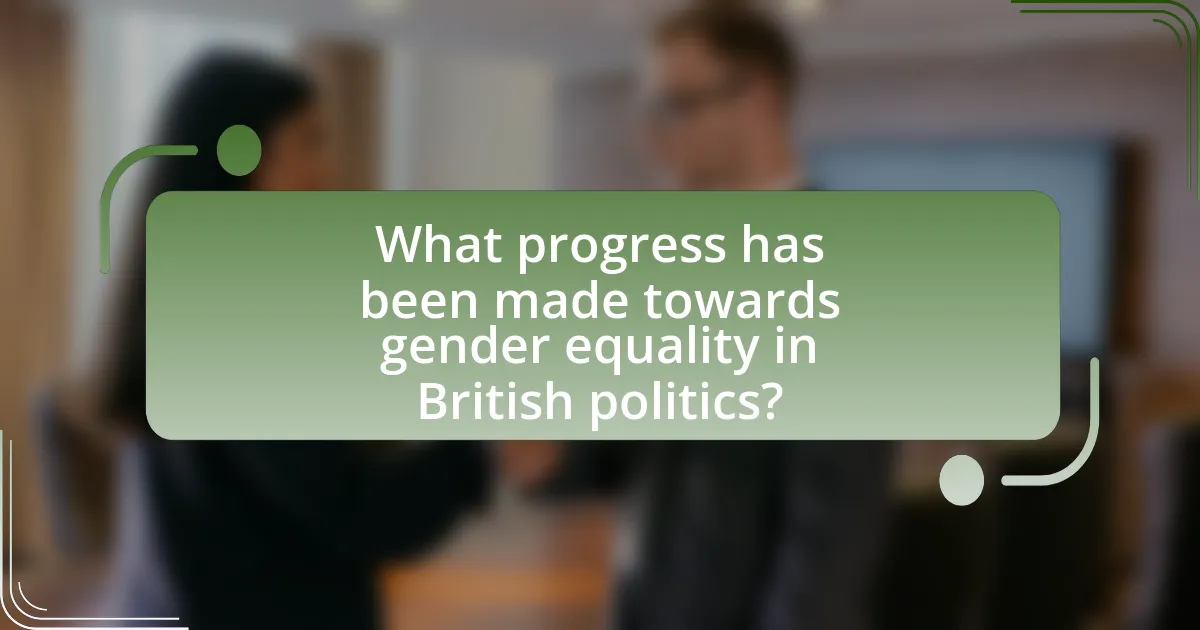
What progress has been made towards gender equality in British politics?
Significant progress has been made towards gender equality in British politics, evidenced by the increasing number of women in Parliament and leadership roles. As of 2023, women hold 34% of the seats in the House of Commons, a notable increase from just 18% in 1997. Additionally, the number of female MPs has risen from 60 to 225 over the same period. The introduction of initiatives such as all-women shortlists by the Labour Party and the Conservative Party’s commitment to gender diversity have further contributed to this progress. Furthermore, women have held key positions, including the Prime Minister and various cabinet roles, showcasing a shift towards more inclusive governance.
What statistics reflect the current state of gender representation in politics?
As of 2023, women hold 34% of the seats in the UK Parliament, reflecting a gradual increase in gender representation in politics. This statistic indicates progress from previous years, where women’s representation was significantly lower; for instance, in 2010, women occupied only 22% of parliamentary seats. Additionally, women lead 50% of the UK’s major political parties, showcasing a shift towards greater leadership roles. Despite these advancements, the representation of women in local government remains lower, with only 30% of councilors being female. These figures highlight both progress and ongoing challenges in achieving gender equality in British politics.
How do the numbers of male and female politicians compare?
As of 2023, male politicians significantly outnumber female politicians in British politics. Specifically, women hold approximately 34% of the seats in the House of Commons, while men occupy around 66%. This disparity highlights ongoing challenges in achieving gender equality within political representation in the UK. Historical data shows that the percentage of female MPs has gradually increased over the years, but men still dominate the political landscape, indicating a persistent gender imbalance.
What trends can be observed in recent elections regarding gender representation?
Recent elections have shown a significant increase in gender representation, particularly with more women being elected to parliamentary positions. For instance, the 2019 UK General Election resulted in a record number of female MPs, with women making up 34% of the House of Commons, up from 32% in 2017. This trend reflects broader societal shifts towards gender equality and the impact of initiatives aimed at promoting women’s participation in politics, such as all-women shortlists and targeted campaigns. Additionally, the presence of women in leadership roles within political parties has also risen, contributing to a more diverse political landscape.
What initiatives have been implemented to promote gender equality?
Various initiatives have been implemented to promote gender equality in British politics, including the introduction of gender quotas, the establishment of the Women’s Equality Party, and the implementation of the Gender Equality Duty. Gender quotas, adopted by several political parties, mandate a minimum percentage of female candidates in elections, significantly increasing women’s representation. The Women’s Equality Party, founded in 2015, aims to address systemic inequalities and advocate for policies that promote gender parity. Additionally, the Gender Equality Duty, enacted in 2007, requires public authorities to actively promote gender equality in their functions, ensuring that gender considerations are integrated into decision-making processes. These initiatives collectively contribute to advancing gender equality within the political landscape in the UK.
How effective have these initiatives been in increasing female political participation?
Initiatives aimed at increasing female political participation in British politics have been moderately effective. For instance, the introduction of gender quotas in political parties has led to a significant increase in the number of women elected to Parliament, with female representation rising from 22% in 2010 to 34% in 2019. Additionally, programs like the Women’s Equality Party and various mentorship schemes have empowered women to engage in politics, contributing to a more diverse political landscape. These initiatives have been supported by research from the House of Commons Library, which indicates that targeted efforts can lead to measurable improvements in female political representation.
What role do advocacy groups play in supporting gender equality in politics?
Advocacy groups play a crucial role in supporting gender equality in politics by raising awareness, influencing policy, and mobilizing public support. These organizations, such as the Women’s Equality Party and the Fawcett Society in the UK, actively campaign for legislative changes that promote equal representation and address gender disparities. For instance, the Fawcett Society has been instrumental in advocating for the implementation of gender quotas in political parties, which has been shown to increase the number of women in elected positions. Additionally, advocacy groups provide resources, training, and networking opportunities for women aspiring to enter politics, thereby enhancing their participation and representation. Their efforts contribute to a more equitable political landscape, as evidenced by the increase in female MPs in the UK Parliament, which rose from 22% in 2010 to 34% in 2019, highlighting the impact of sustained advocacy for gender equality.
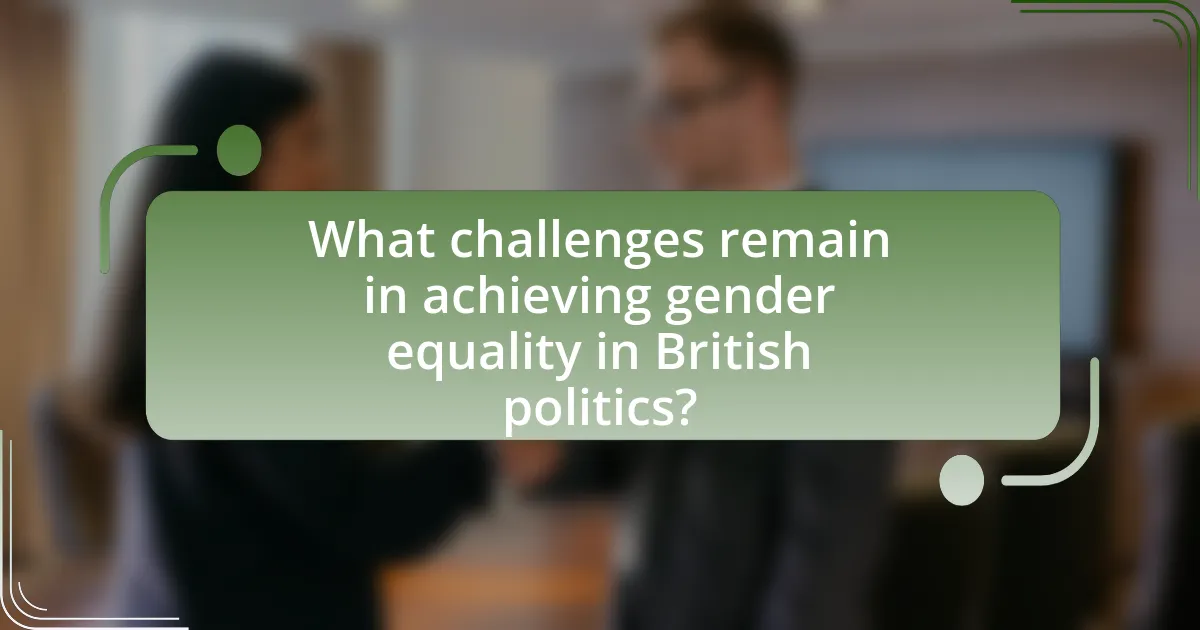
What challenges remain in achieving gender equality in British politics?
Challenges that remain in achieving gender equality in British politics include underrepresentation of women in leadership roles, persistent gender biases, and structural barriers within political institutions. Despite progress, women hold only 34% of seats in the House of Commons, indicating a significant gap in representation. Additionally, cultural stereotypes and biases continue to influence perceptions of women’s capabilities in leadership, which can deter female candidates from pursuing political careers. Structural barriers, such as the lack of flexible working arrangements and inadequate support for childcare, further hinder women’s participation in politics. These factors collectively contribute to the ongoing challenges in achieving true gender equality in British political representation.
What barriers do women face in entering and advancing in politics?
Women face significant barriers in entering and advancing in politics, including systemic discrimination, lack of representation, and cultural biases. Systemic discrimination manifests in political party structures that often favor male candidates, limiting women’s access to leadership roles. The lack of representation is evident, as women hold only about 34% of seats in the UK Parliament, which can discourage potential female candidates from pursuing political careers. Cultural biases also play a role, as societal expectations and stereotypes about gender roles can undermine women’s confidence and support in political environments. These barriers collectively hinder women’s political participation and advancement.
How do cultural and institutional biases affect women’s political careers?
Cultural and institutional biases significantly hinder women’s political careers by perpetuating stereotypes and creating barriers to entry and advancement. These biases manifest in various ways, such as the underrepresentation of women in leadership roles and the prevalence of gendered expectations regarding behavior and competence. For instance, a study by the Inter-Parliamentary Union found that women make up only 34% of national parliamentarians globally, indicating systemic barriers that limit their political participation. Additionally, institutional practices, such as biased recruitment processes and lack of support for work-life balance, further exacerbate these challenges, making it difficult for women to pursue and sustain political careers.
What impact does the political environment have on gender equality efforts?
The political environment significantly influences gender equality efforts by shaping policies, legislation, and societal attitudes. For instance, countries with supportive political frameworks, such as gender quotas and anti-discrimination laws, tend to see greater advancements in gender equality. In the UK, the introduction of the Equality Act 2010 exemplifies how legislative measures can promote equal opportunities and protect against gender-based discrimination. Conversely, a hostile political climate can hinder progress, as seen in regions where regressive policies are enacted, limiting women’s rights and participation in governance. Thus, the political environment acts as a critical determinant of the success or failure of gender equality initiatives.
What are the implications of underrepresentation of women in politics?
The underrepresentation of women in politics leads to a lack of diverse perspectives in decision-making processes. This absence can result in policies that do not adequately address the needs and concerns of half the population. For instance, research from the Inter-Parliamentary Union indicates that countries with higher female representation in parliament tend to have more comprehensive legislation on issues such as gender equality, healthcare, and education. Furthermore, the lack of women in political roles can perpetuate stereotypes and discourage future generations of women from pursuing political careers, thereby reinforcing a cycle of inequality.
How does gender imbalance affect policy-making and governance?
Gender imbalance negatively affects policy-making and governance by limiting diverse perspectives and reinforcing systemic biases. When women are underrepresented in political positions, policies often reflect the interests and experiences of a narrower demographic, which can lead to the neglect of issues that disproportionately affect women, such as reproductive rights and gender-based violence. For instance, research from the Inter-Parliamentary Union indicates that countries with higher female representation in parliament are more likely to pass legislation promoting gender equality. This demonstrates that gender balance in governance is crucial for comprehensive and equitable policy development.
What are the long-term consequences of failing to achieve gender equality in politics?
Failing to achieve gender equality in politics leads to systemic underrepresentation of women, which perpetuates policies that do not address the needs of half the population. This lack of representation results in a governance structure that often overlooks issues such as reproductive rights, childcare, and gender-based violence, which disproportionately affect women. Research indicates that countries with higher levels of gender equality in political representation experience better economic performance and social outcomes, as seen in the World Economic Forum’s Global Gender Gap Report, which highlights that gender parity can enhance decision-making and lead to more comprehensive policy solutions. Thus, the long-term consequences include not only the continuation of gender disparities but also hindered societal progress and economic development.
What strategies can be employed to overcome these challenges?
To overcome challenges in achieving gender equality in British politics, implementing targeted policies and initiatives is essential. Strategies include establishing quotas for female representation in political positions, which has been shown to increase women’s participation in governance. For instance, countries like Rwanda, which adopted a quota system, now have over 60% female representation in parliament, demonstrating the effectiveness of such measures. Additionally, providing mentorship programs for women aspiring to enter politics can help build confidence and skills, as evidenced by initiatives like the Women’s Equality Party in the UK, which focuses on empowering women through training and support. Furthermore, promoting flexible working arrangements and addressing workplace discrimination can create a more inclusive environment for women in politics, as highlighted by research from the Fawcett Society, which emphasizes the need for systemic changes to support gender equality.
How can political parties enhance their commitment to gender equality?
Political parties can enhance their commitment to gender equality by implementing policies that promote equal representation and actively supporting women in leadership roles. For instance, the Labour Party in the UK has adopted all-women shortlists for parliamentary candidates, which has significantly increased the number of female MPs, demonstrating a concrete approach to achieving gender parity. Additionally, parties can establish mentorship programs aimed at empowering women within their ranks, as evidenced by initiatives in various political organizations that have led to increased female participation in decision-making processes. These strategies not only foster a more inclusive political environment but also align with the broader societal goal of gender equality, as supported by research from the Inter-Parliamentary Union, which highlights that countries with higher female representation tend to have more progressive gender policies.
What best practices can be adopted to support women in politics?
To support women in politics, implementing mentorship programs is essential, as they provide guidance and networking opportunities. Research indicates that women who have mentors are more likely to pursue and succeed in political roles. Additionally, establishing quotas for female representation can significantly increase the number of women in political positions; for instance, countries like Rwanda have achieved over 60% female representation in parliament through such measures. Furthermore, providing training on public speaking and leadership skills can empower women to engage more effectively in political discourse. These practices collectively contribute to a more equitable political landscape.
What can individuals do to support gender equality in British politics?
Individuals can support gender equality in British politics by actively participating in advocacy and awareness campaigns. Engaging in organizations that promote women’s representation, such as the Fawcett Society, can amplify efforts for policy changes. Additionally, individuals can vote for candidates who prioritize gender equality and hold elected officials accountable for their commitments to this issue. Research indicates that increasing women’s representation in politics leads to more comprehensive policy-making, as seen in the 2019 UK Parliament, where women made up 34% of MPs, reflecting a gradual increase but still highlighting the need for further progress.
